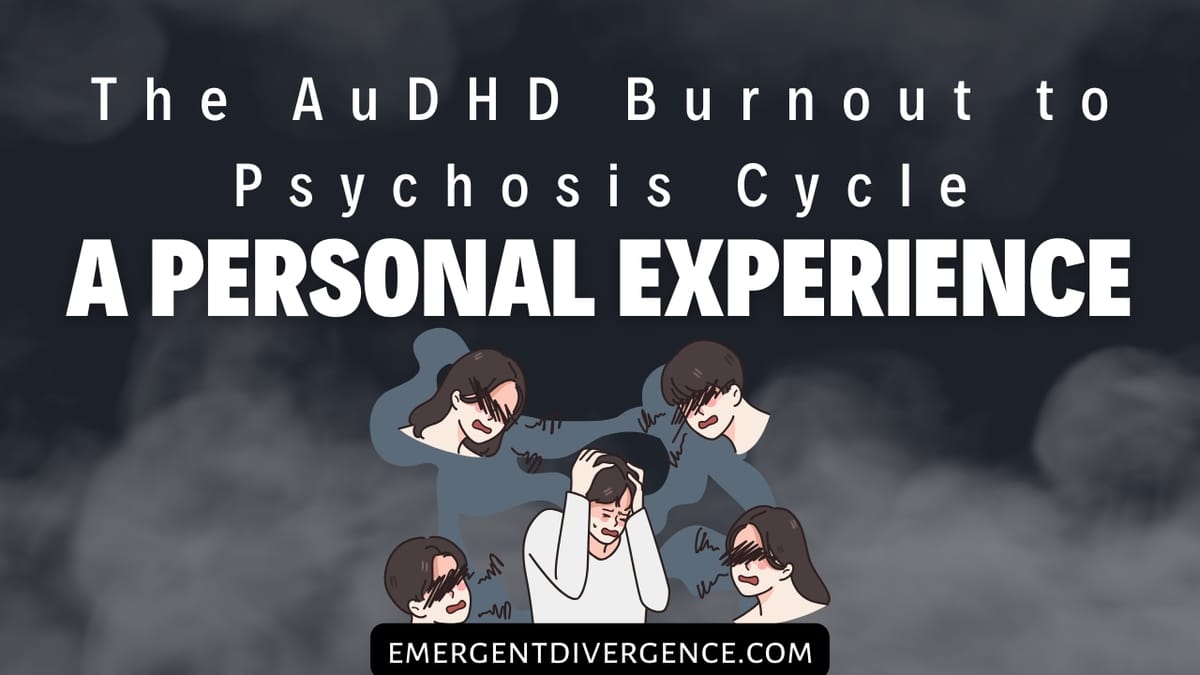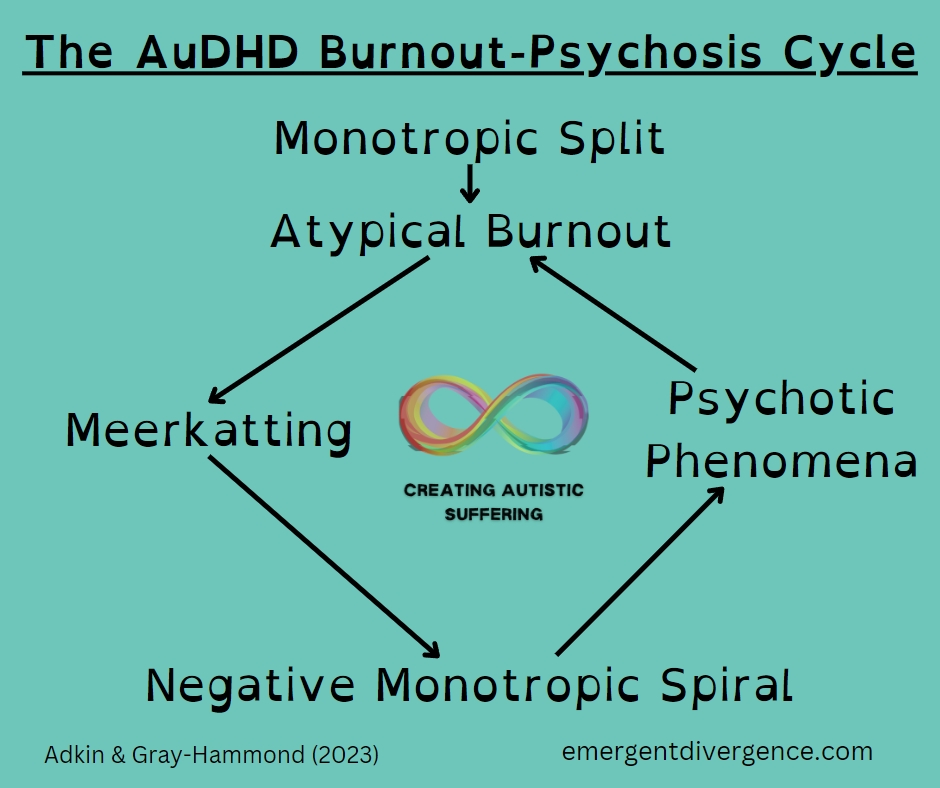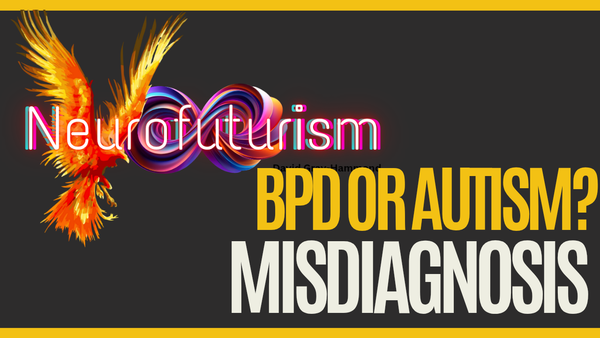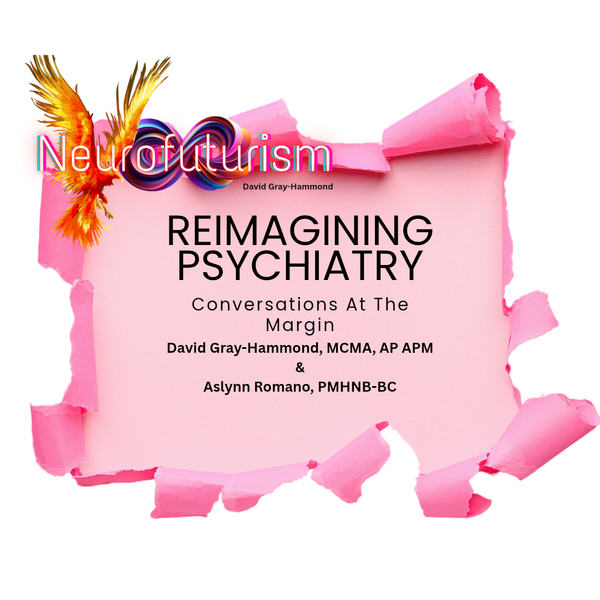The AuDHD Burnout to Psychosis Cycle: A personal experience
"Psychosis adds an interesting spiciness to this experience. When I start sinking, my brain tells me that someone else is pulling me under. This is the type of delusions I experience. They are persecutory in nature, meaning that my mind creates elaborate and bizarre conspiracies in which I am the vi

There are many wonderful things I have discovered about being AuDHD (that is- Autistic and ADHD at the same time). Despite this, there are many challenges I would associate with being neurodivergent. I am also Schizophrenic. Lack of support with these facets of my own neurodivergence took me on a path through drug and alcohol addiction for many years, and also led me into years of psychotic episodes and distress.
This article was rewritten to form a chapter in David's book A Guide to Autism and Psychosis, which can be found by clicking the button below.
It is only by spending time in neurodivergent communities that I have learned to accommodate my own needs as best I can, and advocate for myself where I can't. Something I have learned in particular is that my journey into psychosis tends to follow a familiar cycle. I have previously explored it in the Creating Autistic Suffering series that I co-author, but felt that I wished to bring some more personal perspective to it.
What does AuDHD and Psychosis look like for me?
My particular brand of neurodivergence looks like organised chaos. On the surface I provide a veneer of control while hidden beneath I am paddling desperately to stay afloat. One might imagine this is highly relatable to the countless numbers of AuDHD'ers (50-70% of Autistic people are also ADHD) in the neurodivergent community. Psychosis adds an interesting spiciness to this experience. When I start sinking, my brain tells me that someone else is pulling me under. This is the type of delusions I experience. They are persecutory in nature, meaning that my mind creates elaborate and bizarre conspiracies in which I am the victim of individuals or groups who mean me harm.
This, again, might sound familiar to members of this community. It is thought that almost 35% of Autistic people experience psychotic "traits". This is why I feel it is important to be open about my experience. When I admit to hearing voices, seeing entities that don't exist, and having delusional thoughts, I hope to pave the way for others to be open. I share stories of my manic thinking that has me trying to travel to other countries on impulse because others need to know that they are not alone in the absurdity of complex mental health issues.
The AuDHD Burnout to Psychosis Cycle

1. Monotropic Split
It almost always starts with the number of demands in my life vastly overwhelming the cognitive resources that i have available. I will try and manage competing demands with the same amount of attention (100% hyperfocus) given to each demand. As my monotropic resources are split apart, my AuDHD bodymind enters into Burnout.
2. Atypical Burnout
Atypical because it doesn't fit standard observational models, I find myself dragging my way through each day. Things that I was managing well suddenly become impossible tasks. Unfortunately the demands don't go anywhere. It's not simple to rest as a working parent. It's not simple to say no to people. It costs resources to explain to people that you are overwhelmed and burnt out. This is my story. I can not stop, not least of all because my AuDHD brain needs constant stimulation. Uncontrollable stillness can be just as painful to me as the monotropic split that led me here.
3. Meerkat Mode and Mania
Burnout is an unsafe experience. As we lose skills that we took for granted and our capacity to engage with the world decreases, we can start to lose perspective. What seems simple and manageable to me when doing well, suddenly feels like a terrible thing. I obsess over small details and impulsively make decisions, particuclar financial decision. It is around this time that what people would understand as madness (I am a firm believer in Mad Pride) starts to set in. Everything becomes unsustainable, everything becomes an attack. I am at the centre of a world that is set up to hurt me.
4. Monotropic Spiral
As my mind attempts to piece together and rationalise my struggle with things that once came naturally to me, it starts to add meaning where there is none. Like a black hole, unrelated incidents starts joining together and I obsess over them. I am at this point losing my ability to differentiate between my internal world and the external reality that everyone else seems to agree on.
5. AuDHD and Psychosis
At this point my AuDHD mind has completely lost grip on the reality that we all take for granted. Internal thoughts become disembodied voices, images in my mind take physical form. I impulsively lead from imagined meanings to bizarre conclusions. I am now at the centre of a vast conspiracy where some unknown force is sending me to oblivion. On the surface I may appear a strange mix of manically happy and extremely paranoid. Beneath that mask I am trying desperately to fight with invisible forces that threaten to steal my sanity from me. I am no longer the David that people once knew.
The AuDHD psychosis cycle is self-perpetuating
Something that I learned from these experiences is that it's true; burnout changes you. However, I disagree that this is always a bad thing. If we do not change after such violent experiences of burnout, we will keep restarting the cycle, falling in and out of these experiences time and again. Change can be a tool of recovery, and making those changes can prevent us ending up back where we started. I have had to learn to set boundaries in my life, and advocate as effectively as I can. This can be challenging for people who are in life situations where this is not taken seriously. I would however remind people that it is the people who dislike or ignore our boundaries that are the reason we have them in the first place.
AuDHD people deserve to live happy and fulfilled lives, and while we can not guarantee perpetual bliss, we can take steps to make life sustainable and happy.


